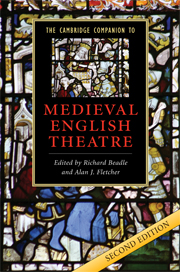Book contents
- Frontmatter
- 1 An introduction to medieval English theatre
- 2 The theatricality of medieval English plays
- 3 The cultural work of early drama
- 4 The York Corpus Christi Play
- 5 The Chester cycle
- 6 The Towneley pageants
- 7 The N-Town plays
- 8 The non-cycle plays and the East Anglian tradition
- 9 Morality plays
- 10 Saints and miracles
- 11 Modern productions of medieval English drama
- 12 A guide to criticism of medieval English theatre
- Select bibliography
- Author index to the bibliography
- General index
5 - The Chester cycle
Published online by Cambridge University Press: 28 November 2011
- Frontmatter
- 1 An introduction to medieval English theatre
- 2 The theatricality of medieval English plays
- 3 The cultural work of early drama
- 4 The York Corpus Christi Play
- 5 The Chester cycle
- 6 The Towneley pageants
- 7 The N-Town plays
- 8 The non-cycle plays and the East Anglian tradition
- 9 Morality plays
- 10 Saints and miracles
- 11 Modern productions of medieval English drama
- 12 A guide to criticism of medieval English theatre
- Select bibliography
- Author index to the bibliography
- General index
Summary
Critics of medieval drama locked into an evolutionary thesis of dramatic development that valued ‘realism’ and ‘comedy’ as marks of later and more highly developed dramatic ‘organisms’ found Chester's less exuberant style reflective of a primitive, undeveloped form of drama characteristic of an early date of composition. They were strengthened in this view by a persistent tradition in Chester that the plays were the oldest in England. Since the 1960s, however, the myth of early composition has been exposed and, after re-examining the internal and external documentary evidence relating to the plays, recent critics believe that Chester's cycle in its present form was the product of the sixteenth century and hence probably the latest of the English cycle texts. Moreover, there are indications in the prefatory Banns of the post-Reformation period that the cycle was even then self-consciously different both from ‘sophisticated’ contemporary drama and from the cycle plays of other towns that were falling under disapproval because of their association with Roman Catholic doctrine.
Chester's distinctive interpretation of cyclic form and function should therefore be recognised as a conscious creation with its own goals and strengths. Freed from the condescension of earlier critics, Chester's achievement can now be appreciated as an attempt to articulate the mystery cycle as a coherent dramatic genre rather than as a conveniently loose chronological framework for the containment of dramatic and thematic diversity. In contrast to the sometimes urgent demands for empathetic response made by York and Towneley, Chester holds its material at a contemplative distance, inviting its audience to ponder its plays calmly and thoughtfully.
- Type
- Chapter
- Information
- The Cambridge Companion to Medieval English Theatre , pp. 125 - 151Publisher: Cambridge University PressPrint publication year: 2008
- 1
- Cited by

